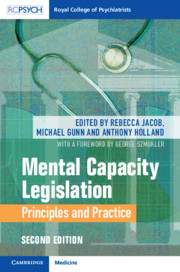Book contents
- Mental Capacity Legislation
- Mental Capacity Legislation
- Copyright page
- Contents
- Contributors
- Foreword
- Preface
- Editors’ Note
- Chapter 1 Introduction
- Chapter 2 The Assessment of Mental Capacity
- Chapter 3 Best Interests
- Chapter 4 Deprivation of Liberty Safeguards: Past, Present and Future
- Chapter 5A Mental Capacity Act Application: Hospital Settings
- Chapter 5B Mental Capacity Act Application: Social Care Settings
- Chapter 6 Mental Capacity and End of Life Decision-Making
- Chapter 7 Clinical Ambiguities in the Assessment of Capacity
- Index
- References
Chapter 2 - The Assessment of Mental Capacity
Published online by Cambridge University Press: 17 June 2019
- Mental Capacity Legislation
- Mental Capacity Legislation
- Copyright page
- Contents
- Contributors
- Foreword
- Preface
- Editors’ Note
- Chapter 1 Introduction
- Chapter 2 The Assessment of Mental Capacity
- Chapter 3 Best Interests
- Chapter 4 Deprivation of Liberty Safeguards: Past, Present and Future
- Chapter 5A Mental Capacity Act Application: Hospital Settings
- Chapter 5B Mental Capacity Act Application: Social Care Settings
- Chapter 6 Mental Capacity and End of Life Decision-Making
- Chapter 7 Clinical Ambiguities in the Assessment of Capacity
- Index
- References
Summary
The Mental Capacity Act (MCA) 2005 (Mental Capacity Act 2005) has had an unprecedented impact on psychiatric practice in England and Wales. The MCA originally arose out of the need to protect individuals lacking capacity in settings aside from mainstream mental health services, where the Mental Health Act 1983 (MHA) (Mental Health Act 1983) provided the dominant legal framework. However the Acts interact in complex ways (Brown et al., 2013; Owen et al., 2009), and increasingly it is expected that mental capacity will be assessed in the context of a decision around admission and treatment in a psychiatric hospital, even if the MHA is ultimately to be used and lack of mental capacity often may act as a gateway into the use of the MHA. Patients who are undergoing inpatient psychiatric treatment must have their authorisation of treatment carefully characterised (Care Quality Commission, 2015/2016), and the new MHA Code of Practice (Mental Health Act 2015) stresses the importance of supporting mental capacity and responding to patients’ ‘wishes and feelings’.
- Type
- Chapter
- Information
- Mental Capacity LegislationPrinciples and Practice, pp. 13 - 33Publisher: Cambridge University PressPrint publication year: 2019



